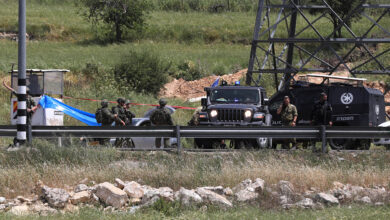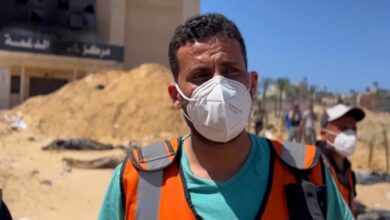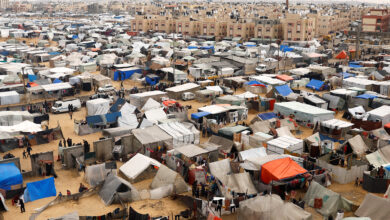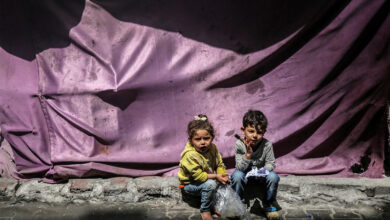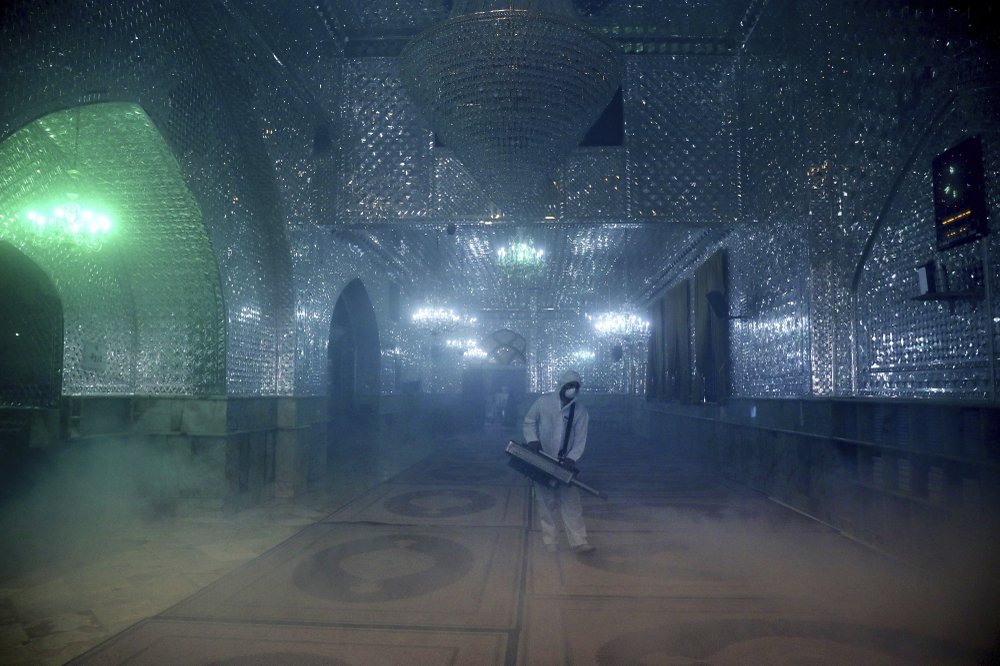
JERUSALEM (AP) — Religious authorities moved to cancel or limit weekly prayer gatherings across the Middle East on Friday to help prevent the spread of the new coronavirus as they encouraged the faithful to pray for those afflicted by the global pandemic.
Christian, Muslim and Jewish leaders in Jerusalem said services would continue to be held in the Holy Land but moved to limit indoor gatherings after the Israeli Health Ministry said they should not exceed 100 people.
At the Western Wall in Jerusalem, the holiest site where Jews can pray, authorities will limit entrance to an enclosed area and set up tents that accommodate up to 100 people. But the Western Wall Heritage Foundation, which oversees the site, said there would be no restrictions on worship in the main plaza as it constitutes a “wide, open space.”
In recent days the foundation has encouraged people to join in special prayers for victims of the virus, which has infected nearly 130,000 people worldwide and caused more than 4,700 deaths.
Israel’s chief Sephardic rabbi, Yitzhak Yosef, meanwhile ordered Jews to stop visiting the Western Wall, cancel mass prayers and pray near their homes “until the wrath passes and mercy comes from heaven.”
For most people, the coronavirus causes only mild or moderate symptoms, such as fever and cough. For some, especially older adults and people with existing health problems, it can cause more severe illness, including pneumonia. The vast majority of people recover from the new virus and the COVID-19 illness it causes.
But the rapid spread of the virus has caused worldwide alarm, tanking financial markets, disrupting travel and leading to large-scale shutdowns in some areas.
The Islamic endowment that oversees the Al-Aqsa mosque compound in Israeli-annexed east Jerusalem, the third holiest site in Islam, said Friday prayers would be held as normal but encouraged people to pray in the outer courtyards and refrain from crowding inside the mosques. It advised the elderly and sick not to enter crowded mosques.
The Latin Patriarchate in Jerusalem called on churches to enforce the Health Ministry’s guidelines, including with Sunday services. It invited everyone to pray for “those directly and indirectly affected by this malevolence.”
Hard-hit Iran has already cancelled Friday prayers in major cities, and on Friday Kuwait said all public prayers would be cancelled until further notice. Egypt has ordered all mosques to limit Friday prayers, including the weekly sermon, to no more than 15 minutes. The prayers usually last around an hour.
Iraq, which has reported more than 80 confirmed cases of the coronavirus and eight deaths so far, has scrapped Friday prayers in the Shia holy city of Karbala and in the country’s predominantly Kurdish region in the north.
Iraq’s most influential Shiite cleric, Ayatollah Ali al-Sistani, whose Friday sermon from Karbala provides guidance for millions, last week urged people to abide by a ban on mass prayers.
In Lebanon, Friday prayers have been temporarily suspended in all Shiite mosques. The country’s top Sunni authority has said it is forbidden for anyone with a contagious disease to attend prayers and has urged elderly people and those with weakened immune systems to pray at home.
The moves to limit prayers come on the heels of several cancellations of sporting events, conferences and other gatherings worldwide.
Dubai announced that a major horse race planned for March 28 would be held without spectators. The Dubai World Cup is the world’s richest purse for horse racing, with a $12 million prize last year. Dubai’s crown prince, Sheikh Hamdan bin Mohammed Al Maktoum, separately announced a $400 million stimulus plan for the city-state whose real-estate market and tourism industry have been hard-hit by the virus.
Dubai International Airport, the busiest for international travel and home to long-haul carrier Emirates, has seen passenger numbers plummet.
Tiny, energy-rich Qatar shut down all cinemas, theaters, museums, children’s play areas, gyms and wedding halls overnight.
King Hamad bin Isa Al Khalifa of the island nation of Bahrain meanwhile released nearly 1,500 prisoners, around 900 of whom were pardoned. The move appeared aimed at preventing the virus from spreading inside detention facilities.
It wasn’t immediately clear if those released included opposition activists detained as part of Bahrain’s yearslong crackdown on all dissent.
In Iran, state-run TV announced that Ali Akbar Velayati was quarantined at home after testing positive for the virus. He is a close, trusted adviser to Ayatollah Ali Khamenei, the 80-year-old supreme leader of the Islamic Republic, who was recently seen wearing disposable gloves at a tree-planting ceremony, apparently out of caution about the virus.
The outbreak has reached Iran’s top officials, with its senior vice president, Cabinet ministers, members of parliament, Revolutionary Guard members and Health Ministry officials among those infected.
Iran has reported more than 10,000 cases and more than 400 deaths, making it among the worst outbreaks worldwide. There are concerns that the number of infections is much higher.
In Israel, concerns about the virus may lead to a brief respite from the yearlong political deadlock between Prime Minister Benjamin Netanyahu and his main rival, former military chief Benny Gantz, after three inconclusive elections.
Netanyahu, who is set to face trial on corruption allegations next week, has called for an emergency national government to combat the pandemic, and Gantz has said he is open to the idea. They are expected to hold talks in the coming days.
Israel has reported more than 100 cases, with the numbers ticking up in recent days.
It has imposed a number of tough restrictions to slow the spread of the virus, placing tens of thousands of people into protective home quarantine, ordering all Israelis who return from overseas into quarantine and barring almost all tourists from entering the country.
Reporting by Joseph Krauss; Associated Press writers Isaac Scharf; Jon Gambrell in Dubai, United Arab Emirates; Noha ElHennawy in Cairo; Bassem Mroue in Beirut and Amir Vahdat in Tehran, Iran, contributed.
Image: A firefighter disinfects the shrine of Saint Saleh to help prevent the spread of the new coronavirus in northern Tehran, Iran, Friday, March, 6, 2020. A Health Ministry spokesman warned authorities could use unspecified “force” to halt travel between major cities. (AP Photo/Ebrahim Noroozi)

